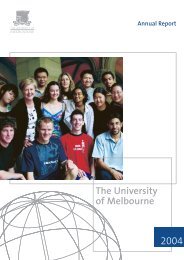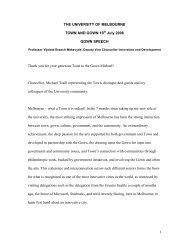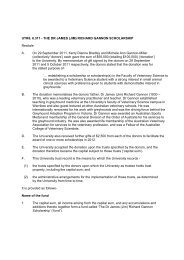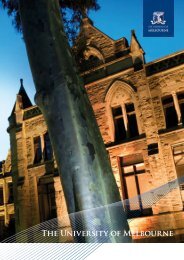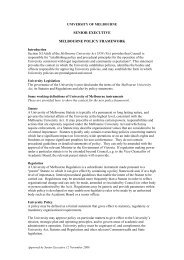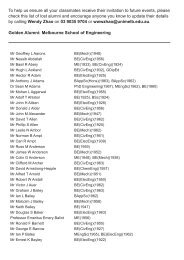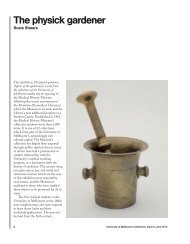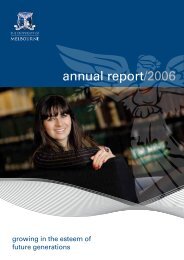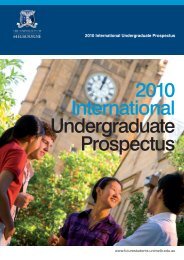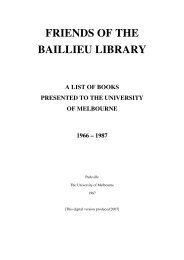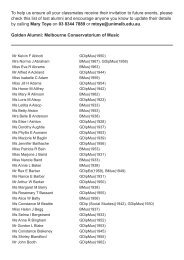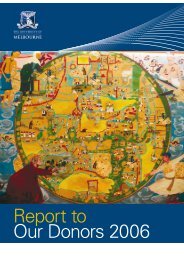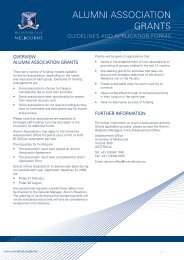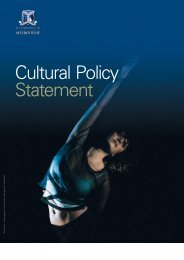Review of Australian Higher Education The Bradley Review
Review of Australian Higher Education The Bradley Review
Review of Australian Higher Education The Bradley Review
You also want an ePaper? Increase the reach of your titles
YUMPU automatically turns print PDFs into web optimized ePapers that Google loves.
<strong>The</strong> overall student income support system is<br />
also very complex. Students from families in<br />
the lower‐income brackets have three potential<br />
sources <strong>of</strong> Commonwealth support: Youth<br />
Allowance, Family Tax Benefit A (FTB A) and<br />
Commonwealth Scholarships.<br />
Youth Allowance and FTB A interact in a particularly<br />
confusing way. Households can receive one or the<br />
other for a dependent full-time student aged 24 or<br />
under. Though students earning less than $236 a<br />
fortnight are entitled to some Youth Allowance<br />
until their parents’ income reaches about $1,140 a<br />
week, beyond about $1,016 a week the household<br />
is better <strong>of</strong>f forfeiting Youth Allowance and taking<br />
the FTB A payment instead (the precise cut-<strong>of</strong>fs<br />
vary depending on other family circumstances).<br />
If the student earns more than $236 a fortnight,<br />
the calculation is more complicated still. Under<br />
FTB A, a dependent student can earn up to $472 a<br />
fortnight before payments are affected. Families<br />
would need to use a spreadsheet to work out<br />
which option is better for them.<br />
Commonwealth Scholarships are not counted<br />
towards income tests, but they are limited<br />
in number and students must apply for them<br />
separately, to the university they want to attend,<br />
rather than through Centrelink.<br />
Though the student income support system is<br />
very poorly designed, it is difficult to remove all the<br />
anomalies without causing hardships and injustices<br />
in individual cases. Significantly extending eligibility<br />
and increasing payment rates would, however,<br />
lead to expenditure increases that are unlikely to<br />
be acceptable to government. Priorities need to<br />
be set.<br />
<strong>The</strong> most urgent situation is students living away<br />
from home, particularly those students needing<br />
to move to study because <strong>of</strong> limited options near<br />
their home. <strong>The</strong>y need to be able, through a mix<br />
<strong>of</strong> benefits and reasonable work hours, to earn<br />
enough to live on. <strong>The</strong> various existing poverty<br />
line measures may be helpful in determining<br />
this amount.<br />
After them, students from low and middle-income<br />
groups living at home are the next most urgent<br />
priority. A relaxation <strong>of</strong> both the parental and<br />
personal income tests would significantly improve<br />
their situation even without changing the base rate<br />
<strong>of</strong> Youth Allowance.<br />
<strong>The</strong>se reforms could be financed by abolishing<br />
FTB A for parents <strong>of</strong> students and the<br />
Commonwealth Scholarships, and by tightening<br />
the test for independent living-at-home Youth<br />
Allowance. Under the current system, students<br />
working only 15 hours a week for two years—only<br />
slightly above the average paid work hours for<br />
full-time undergraduates—can be classed as<br />
‘independent’ <strong>of</strong> their parents. <strong>The</strong> test should be<br />
revised so that only those with work records that<br />
could make them genuinely independent <strong>of</strong> their<br />
parents qualify for benefits.<br />
This entitlement-based income support scheme<br />
would be superior to the Commonwealth<br />
Scholarships. It would be fairer, because students<br />
in similar circumstances would receive the same<br />
benefits. It would have stronger influence on low<br />
SES young people considering study, because it<br />
would be an entitlement to income support, not<br />
just a possibility. And it would greatly simplify<br />
their income support calculations, making all the<br />
information easily accessible at a single place on<br />
the Centrelink website.<br />
Fully sorting out student income support requires<br />
detailed analysis <strong>of</strong> current beneficiaries and those<br />
not receiving support, along with cross-portfolio<br />
negotiations on FTB A. This is likely to be too<br />
large a task for this current review. <strong>The</strong> review<br />
panel could helpfully recommend that another,<br />
more specialised review be set up to investigate<br />
the options.<br />
Recommendations:<br />
Establish a further specialist review to<br />
devise a new income support scheme.<br />
Simplify the income support scheme for<br />
students to understand, give highest<br />
priority to those in most financial need,<br />
and allow students to reach at least<br />
poverty line incomes through reasonable<br />
work and benefits.<br />
University <strong>of</strong> Melbourne <strong>Bradley</strong> <strong>Review</strong> Submission 19




